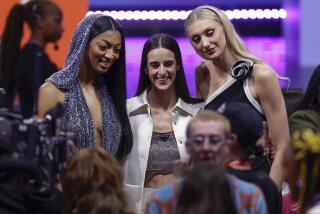Laker Stars See Rap as Free Speech
- Share via
Laker stars Shaquille O’Neal and Kobe Bryant, each of whom has cut hip-hop albums, may not agree with Allen Iverson’s lyrics in his controversial rap song, but they defend his right to free speech.
O’Neal, who has made four rap albums, one of them selling more than 1 million records, insisted that Iverson’s choices of message and lyrics are his to make. Also, his to bear.
“You just have to be yourself,” O’Neal said.
Bryant, who termed the intensity of outrage pointed at Iverson as unfair, says he has not listened to and is not curious about “40 Bars,” the offending piece on the album “Non-Fiction” that made the Philadelphia 76er guard the NBA’s hip-hop version of John Rocker and NBA Commissioner David Stern the spirited social commentator.
Neither does Bryant wish to weigh the rap song against the overwhelming criticism of Iverson’s musical characterization of gays and women or the 76er’s glorification of gun battles.
But Bryant defended Iverson’s freedom to create and sell the music, even as Iverson apologized to the offended and later promised to alter his lyrics. “It’s freedom of speech,” Bryant said.
At a time when the NBA’s superstars are viewed and promoted as equal-parts athlete and entertainer, the highest-profile players spread their lives, and fans, across both arenas.
Bryant’s single--”k.o.b.e.”--is in stores. “Visions,” his first album, is due out soon. Along with his musical career, O’Neal, who is a towering NBA personality, has had large roles in several movies.
“We all come from different backgrounds,” Bryant said. “The whole thing about hip-hop is expression, expressing your true self, expressing your feelings about the world as you see it. Obviously, some of us perceive the world different than others. People may argue that it’s not the right thing to do, corporate-wise, or because he’s a role model or something. But, the whole art of hip-hop is expressing yourself. That’s what he decided to do.”
Iverson’s album was panned by not only the NBA establishment, but by many civil rights groups, including the Martin Luther King Jr. Assn. for Nonviolence. Iverson met with officials from the National Assn. for the Advancement of Colored People. Offended groups picketed. Radio stations that played the song edited it first.
Stern met with Iverson, then issued a statement that rebuked the player and labeled the product “coarse, offensive and antisocial” but asserted that “the NBA should not be in the business of regulating artistic impression, no matter now repugnant.”
If Iverson the NBA all-star were responsible to Iverson the rap artist, and to the fans of both, then Stern left it ultimately to Iverson the man, and to public opinion.
“I absolutely see the conflict,” Bryant said.
But, he said, none of the blurred lines, none of the social arguments, could ever warrant censorship.
“People have been riding him since he got in the league for his off-the-court activities,” Bryant said. “It’s not like--in their eyes--he’s got some clean-cut image. For people to be jumping down his throat right now, it’s not anything new.
“Now, is it fair? No, I don’t think it’s fair. That’s how he decided to express himself. He decided to express how he saw the world coming up, growing up. Those are some of the things he went through, and he decided to share it with the rest of the world.
“He definitely has a responsibility [to the public]. But, it’s our duty to take what he’s saying and understand where he’s coming from. Being a role model does not say that you have to be perfect all the time. It does not mean that you have to tell lies, either. You have to be true to yourself. It’s on us to say, ‘What made him say this? Why is he going through this?’ There are other kids out there going through this same situation. It’s not new. As far as gay-bashing and calling women whores, things of that nature, those are things I don’t agree with.”
The core issue, according to some critics, is the effect the lyrics could have on children. They are the fans who may buy Iverson’s CD simply because they wear his jersey, because they love the 76ers, because the only crossover move they know is with a basketball. Others say it may be impossible to simultaneously be true to the music genre, particularly gangsta rap, and the NBA fan.
“To me,” O’Neal said, “image is reality. I was brought up a certain way. First of all, I love women. I’ve got five sisters I love to death. I have a daughter I love to death. So, it really wouldn’t be nice for me to call women . . . . However, if I didn’t have that in my life, how would I be? You never know. Second of all, me as a rapper, I only talk about stuff that I know. I don’t know anything about guns. I don’t know anything about drugs. I don’t know that. Do I listen to that type of music? Yes, I do. The reason why I listen is because I was taught to be a leader and not a follower. So, if we teach our children to be leaders and not followers, no matter what you see, no matter what you hear, it really doesn’t matter.”
More to Read
Go beyond the scoreboard
Get the latest on L.A.'s teams in the daily Sports Report newsletter.
You may occasionally receive promotional content from the Los Angeles Times.










